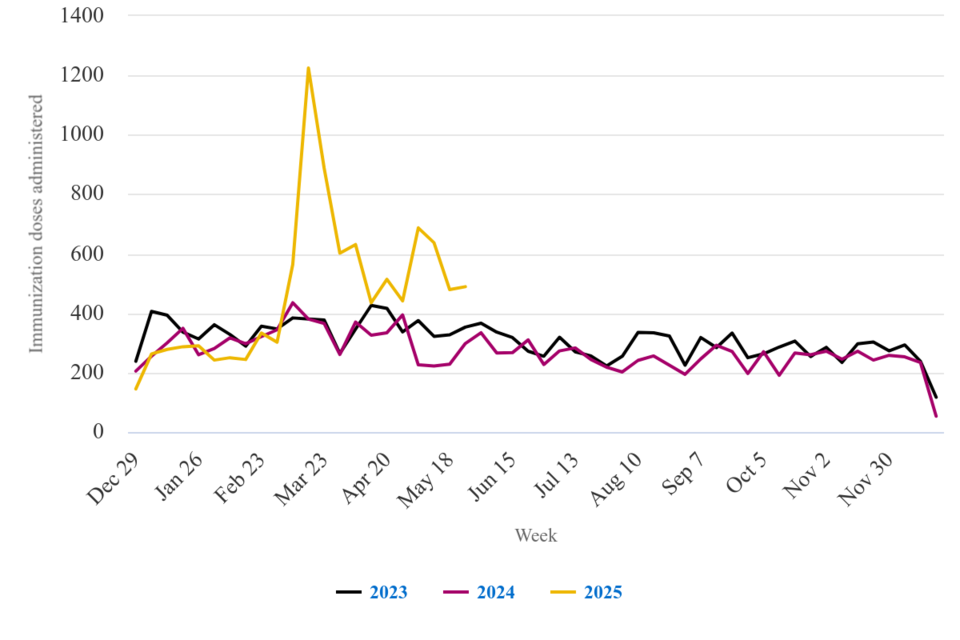LAKELAND - As measles continues to spread around the province, public health authorities and school boards are both encouraging families to get vaccinated.
As of June 9, there were 24 active cases in Alberta and 809 cases total. As of June 8, five people were hospitalized, including two in intensive care.
A spokesperson for Conseil-Scolaire Centre-Est said they do not have an immunization policy for students.
According to Bridget Severin, a spokesperson for St. Paul Education, the division also does not have a specific policy in place requiring proof of immunization for school attendance but does encourage families to follow the province’s immunization schedule.
“We work closely with Alberta Health Services to manage communicable diseases in schools, following their guidance and ensuring families are provided with information to make informed decisions,” said St. Paul Education Superintendent Dr. Peter Barron.
“Our focus is on educating students by following the provincial curriculum and supporting the health and well-being of students and staff through good hygiene practice and collaboration with public health as needed," said Barron.
In a letter dated June 6 and shared with parents by St. Paul Education, Alberta’s Interim Chief Medical Officer of Health Dr. Sunil Sookram said the illness often hits young children the hardest.
More than two thirds of confirmed measles cases in Alberta have been in children under the age of 17. There are 376 cases in school aged children ages five to 17, 233 cases in children under the age of five, 196 in adults aged 18 – 54 and four in adults aged 55 or older.
“It’s a highly contagious illness that spreads quickly, especially in close-knit communities where people gather frequently and where immunization rates are lower,” said Sookram.
Prior to the outbreaks, the province’s Interactive Health Data Application showed comparatively low vaccination rates across much of the Lakeland, especially for children under the age of seven.
The provincial immunization schedule recommends all children receive a measles vaccine at 12 months and again at 18 months, although infants living in the North, Central, and South zones are currently able to be vaccinated as early as six months.
According to the data, in Two Hills just 23 per cent of seven-year-olds have received two doses of the Measles Mumps Rubella (MMR) vaccine, compared to 71 per cent province-wide. In Lac La Biche, 54 per cent of the 2017 cohort have received two doses, in Frog Lake 59 per cent, in Smoky Lake 60 per cent, in St. Paul 64 per cent, in Vegreville 66 per cent, Vermilion 67 per cent, in Bonnyville 72 per cent and in Cold Lake 76 per cent.
The 2021 cohort in St. Paul fares substantially worse, with just 51 per cent of children receiving their second dose by age two.
“Rest assured that there are protocols in place if there is a measles case reported at your school. Direction will be provided by public health staff under the direction of the Medical Officer of Health on next steps to help reduce the risk of further spread within the school and broader community,” reads the letter.
According to Shelly Willsey, a spokesperson for Alberta Health Services (AHS), AHS Public Health works with schools to deliver the School Immunization Program, “which includes administration of delayed routine childhood immunizations in schools to students in Grades 1, 6 and 9.”
According to the AHS website, public health reviews the immunization records for those grades each year and sends home consent forms and information about any recommended vaccines with the students.
“No immunizations will be given in school without consent from a parent or legal guardian,” according to AHS.
Data on how many students are brought up to date on their vaccines as a result of the school immunization program is not available at this time, but Willsey encouraged anyone who wants more information about vaccines to visit ahs.ca/immunize, which offers “immunization tools and resources that are aligned with their needs. Families can also call Health Link 811 or visit their healthcare provider to discuss their needs.”
In his letter, Sookram also thanked parents “for doing their part to stay informed and getting themselves or their children immunized over the past few months,” noting the MMR vaccine is highly effective at preventing measles infection and complications.
According to data released by the province, an average of 633 people received their MMR vaccine in the North Zone each week since March 9, compared to an average of 320 people per week during the same time period in 2024. This does not include doses given to infants under 12 months of age or “measles immunoglobulin administered as post-exposure prophylaxis.”
Measles complications can include pneumonia, ear infections leading to permanent hearing loss, inflammation of the brain, diarrhea, and seizures.
Lakeland This Week also asked Northern Lights Public School Division and Lakeland Catholic for information regarding their immunization policies and any response to the ongoing measles outbreaks, but did not receive a response.



